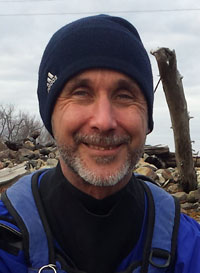The Centre for Forest Research
The Centre for Forest Research (CFR, CEF in French) brings together the scientific expertise of 75 researchers from 11 Quebec universities (Concordia, McGill, UQAC, UQAM, UQAT, UQO, UQAR, Université de Montréal, Université de Sherbrooke, Université Laval and TELUQ). These researchers work in the fields of biology, ecology and forest management. In Quebec, the Centre for Forest Research is unique because it is the only group whose central mission is advanced training and research on the forest.
The Centre for Forest Research also has more than 60 associate researchers from Quebec, Canadian and foreign organizations. Finally, more than 450 doctoral and master's students are studying there. It is the largest center in the field of forest ecology in Canada and one of the largest in the world.
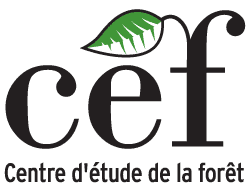
The CFR in numbers
- 11 universities
- 75 regular researchers
- 60 associate researchers
- more than 370 graduate students
- more than 46 postdoctorates students
- more than 55 professionnals of research
- more than 200 articles published by year
- more than 13M dollars per year in research subventions
The strength of CFR lies in its ability to integrate appropriate scientific knowledge that is required to conceive new strategies and practices which will allow a shift in current management approaches to the ecosystem-based management of provincial forest lands, a key recommendation of the 2004 Coulombe Commission Report, Commission d’étude sur la gestion de la forêt publique québécoise ![]() (Rapport Coulombe, December 2004).
(Rapport Coulombe, December 2004).
History
CFR arose in 2006 from the merger of the CRBF (In English, the Centre for Research in Forest Biology) and GREFi (In English, the Inter-University Forest Ecology Research Group).
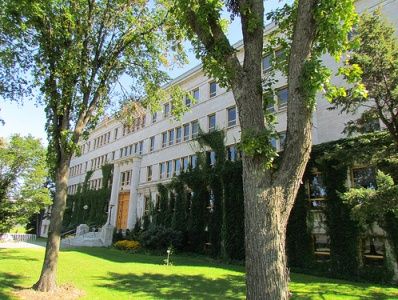
The CRBF in numbers (2004)
- 22 regular researchers
- 11 associate researchers
- 150 graduate students
- more than 50 other members
The two founding research centers were created almost 20 years before the foundation of the CEF.
The CRBF was founded in 1985 by researchers at Laval University, and from its inception, was devoted to research and advanced training in forest biology. Between 1986 and 2004, the Centre was recognised by FQRNT (The Fund for Research on Nature and Technologies), a provincial agency with a unique recognition of forestry research. Professor J. André Fortin was the first director of the CRBF, and was succeeded in the post by professors Maurice Lalonde, André P. Plamondon, Jean Bousquet, Louis Bernier and André Desrochers. At the beginning, the CRBF included 7 professors and some 30-plus students.
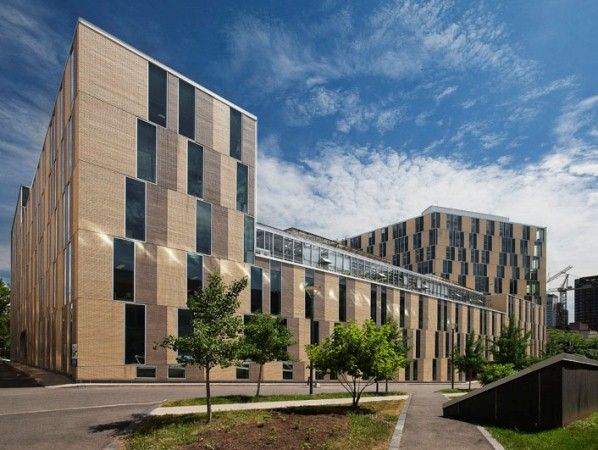
The GREFi in numbers (2005)
- 33 regular researchers
- 27 associate researchers
- 150 graduate students
- 40 other members
The GREFi was founded in 1987 by 3 professors in the Department of Biological Sciences, University of Quebec at Montreal (UQAM). In 1997, the Centre (GREF) truly became a inter-universitary group, as GREFi now included researchers and their students from UQAM, McGill University, Concordia University, the University of Montreal, the National Institute of Scientific Research (INRS - Armand Frappier Institute), the University of Quebec at Chicoutimi (UQAC) and the University of Quebec in Abitibi-Temiscamingue (UQAT), together with a number of scientists from 8 other institutions. GREFi facilitated the gathering of specialists in various disciplines, who concentrated their efforts on forging a better understanding of forest ecosystems. In 2005, GREFi was headed by Christian Messier.
Mission
The strength of the CFR lies in its integration of scientific information in conceiving strategies and providing practical knowledge that will permit a shift in current forestry management practices to ecosystem-based management of provincial forest lands. Forest management in the 21st century must also take into account numerous emerging phenomena (biological invasions, climate change, habitat fragmentation).
In response to these challenges, the scientific mission of CFR is to better understand the functioning and dynamics of forest ecosystems, the interactions between their components, as well as their distinctive biologies, within a perspective that reconciles conservation of biodiversity with increasing basic commercial productivity.
The CFR mission encompasses 4 research themes:
The principal social mission of CFR is to produce highly qualified personnel in the fields associated with the 4 research themes and to contribute vigorously to the transfer of knowledge to partners and the public through close collaboration with organisations of information transfer. The CFR is eager to increase its international profile in terms of its ability to meet new challenges in forest management and conservation in a manner that is both scientifically credible and multidisciplinary.
With this intention in mind, the CFR is financially supporting international internships, visits by well-known scientists, thematic courses and annual conferences. Also, it has set in place an integrated network of research professionals, who are specialists in the service of scientists and students in all our member institutions.
Regional poles of CFR
Participating universities are grouped into 4 regional centers providing logistical and administrative support to members. Each pole is represented by a regular member on the executive committee. Research professionals of CFR are also divided into the 4 poles to allow direct access to students in each of them.
Montreal Pole
- Université du Québec à Montréal (UQAM)
- McGill U.
- Université de Montréal
- Concordia U.
- Université du Québec en Outaouais (UQO)
- TÉLUQ
Eastern Pole
- Université Laval
- Université du Québec à Chicoutimi (UQAC)
- Université du Québec à Rimouski (UQAR)
Abitibi-Temiscamingue Pole
- Université du Québec en Abitibi-Témiscamingue (UQAT)
Sherbrooke
Pole
- Université de Sherbrooke
Executive committee

Daniel Kneeshaw
Codirector

Annie Deslauriers
Codirector
Representatives of the poles, associate members and students

Yan Boucher
Representative for the Eastern Pole
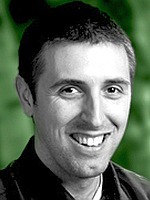
François Girard
Representative for the Montreal Pole

Miguel Montoro Girona
Representative for the Abitibi-Temiscamingue Pole

Isabelle Laforest-Lapointe
Representative for the Sherbrooke Pole
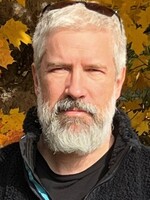
Martin Barrette
Associate and government members representative

Julie-Pascale Labrecque-Foy
Students representative

Luc Lauzon
Secretary
Student representation of the administrative poles
The role of the student representation of the 4 administrative poles of the CEF is to make the link between the students of each pole and the Executive Committee of the CEF. They are there to ensure good communication, to inform the Executive Committee of the needs of students (financial support, scientific activities, etc.) and make sure to inform their peers of the decisions taken by the committee.
A student member sits on the Executive Committee with the right to vote. The student representative is chosen from among the student representatives of the administrative centres.

Aya Garfa
Representative for the Eastern Pole

Julien Bilodeau-Colbert
Representative for the Montreal Pole

Julie-Pascale Labrecque-Foy
Representative for the Abitibi-Temiscamingue Pole
Meghana Paranjape
Representative for the Sherbrooke Pole
CFR-ULaval Director
As a recognized research center of Université Laval, the Laval component of the CEF has its own management. The director is a regular member of the CEF, a researcher at Université Laval, elected by the regular members of the CEF of Université Laval. He makes sure to maintain a link with the executive committee and the student representative of the Quebec City cluster.

Marc Mazerolle
CFR-ULaval Director





